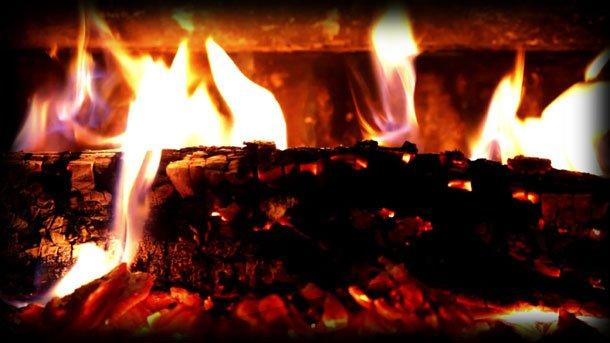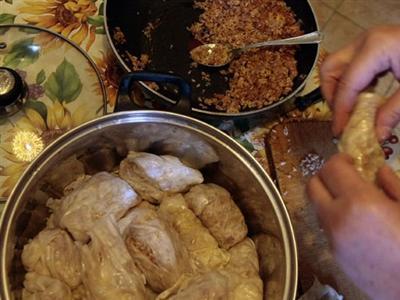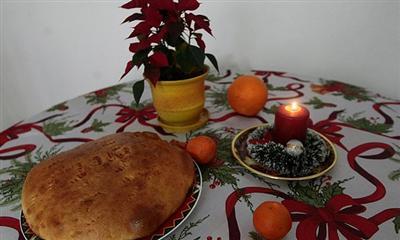Christmas has been a major holiday in the Bulgarian lands since pre-Christian times, when there existed a cult of the Sun, born again and again every year in the days around the winter solstice. People once believed that on Christmas Eve the skies opened up, the borderlines between worlds were obliterated and a period of transition set in. The entire intricate system of rituals surrounding Christmas Eve spun around this idea. Belief in the forces of good, the manifested reverence for them and a correct conduct all restored order. They brought the human being in synchrony with the cosmic processes, helped him take his place in the light in the eternal battle against evil, bringing him closer to godliness.

© Photo: archive
Just as nowadays, not everyone knew the real meaning of the rituals but accepted this knowledge coming down from their ancestors. It was unthinkable for the home not to have a budnik – a big log chopped off that same morning and left to burn through the night. This was one of the men’s jobs. The log had to be prepared and that took time. The women would cook the dishes for the evening meal – meatless, an odd number but no less than seven. Everything the land had yielded throughout the year was put on the table. Alongside the meatless dishes there were walnuts, garlic, onions, raw wheat, dried fruit. As well as heated and seasoned rakia – brandy – and wine. A ritual loaf was baked and a coin was put inside – whoever got it when the bread was handed out, his would be the luck during the year. Before sitting down to table, the oldest man of the house would say a prayer and thurify the house and the food with incense. This is the kind of meal we have to this day and even children know what should be laid on the table. There is something very warming in the hustle and bustle preceding Christmas Eve when families come together. For the generations born between the 1950’s and the 1970’s, the time of totalitarian rule, Christmas Eve only acquired special meaning after the changes in 1989. But today it seems to us all that things have never been any different. As preparations were, by a tradition, up to the women in the family, we invited three ladies to tell us what they remember of Christmas Eve.
Film director Maya Vaptsarova takes us back to the 50’s. She is from Sofia but back then her parents entrusted her upbringing to her grandmother – mother of her mother and of her uncle, poet Nicola Vaptsarov:

© Photo: BGNES
“I remember well the enormous oven at my grandmother Elena’s house,” she says. “In Bansko temperatures are very low in winter. And when snow falls, drifts are as high as a man is tall. Early on Christmas Eve morning we put the budnik into the fire – a very stout log that burned through the night. Then we would thurify the entire house with incense and afterwards – then we would put into the oven meatless surmi or stuffed cabbage rolls. The kapama - a dish comprising three kinds of meat plus bacon – would also be put into the oven to cook until the next day. Eating meat on Christmas Eve is a sin, everyone knows that. One of the most amusing stories that were told in my family goes back to the time of the San Stefano peace treaty of 1878, which put an end to the Russo-Turkish war which liberated Bulgaria. Several months later it was revised by the Berlin congress of the great powers, under which part of Bulgaria – the part where the town of Bansko now is – was left under Ottoman rule. I remember listening to this story and beginning to realize the meaning of Christmas Eve. In 1878 my great-grandfather Nicola and the mayor of Bansko decided to make kapama with meat for the feast. They commissioned 70 cauldrons of kapama and all over Bansko fires were lit and steam rose up to the sky. “Why are you putting meat into the kapama? It is the Advent fast,” everyone would ask him. And he would answer: “Those that signed the Berlin treaty are going to hell. So, I’m cooking kapama with meat in it – so that I will go there as well. And when I see them trying to get out of the cauldron – I can hit them over the head with a pitchfork. Because the devil might not see them.” He was convinced the enormous injustice of Bulgaria’s being divided would be punished. So he deliberately decided to commit a sin and go to hell where he could take vengeance on the people responsible for this. This is a story that was always told at my house around Christmas time. I remember my grandmother calling Christmas Eve “the winter spring”. She used to say: “Winter spring has come, my child.” “Why?” I would ask. “Because that is when the family is re-born. When you all get together, when you tell the others what you have experienced – that is winter spring.” And in truth my parents would come from Sofia on Christmas Eve, the whole family would gather. We used to sit close to the ground around a low table. It was only much later that my grandmother got a table that was higher. We would all gather around this table and it warmed our hearts. Besides the meatless dinner, we would bake sweetmeats called koukourini - a very fine phyllo pastry sheet, sprinkled with sugar.”
Here is what Shevkie Chakur, editor at Radio Bulgaria’s Turkish language service says about the way she spends Christmas Eve:

© Photo: BGNES
“Every year we celebrate with a family of friends. And we keep to the tradition. We always have no less than seven dishes on the table and a candle that burns through the evening. The soda loaves, stuffed with dried pepper, with beans, the walnuts, the wheat, we have everything the tradition requires. The dishes must always be an odd number. And when our own feast time comes – Ramadan Bayram, they come to visit us. During the Sacred Month of Muharram there is one day when frumenty is prepared in honour of the prophet Noah. It too is filled with things that are odd in number – wheat, walnuts, dried grapes etc. No less than nine, but always an odd number. We are very happy to be able to share our feast days. When we sit down at the Christmas Eve table, laden with fine food and wine and what is more important – alive with a friendly feeling and cheer – that always leaves us with one more wonderful memory. We share the good and the bad times. The traditions, though different for the different ethnic groups should bring us together not set us apart. This is what we believe and what we try to teach our children.”
Many Bulgarians around the world observe Christmas Eve traditions. But there are foreigners who keep to these traditions as well. One of them is the French opera singer and mother of renowned jazz pianist Mario Stanchev – Micheline Stanchev. She now lives in Paris but continues to celebrate the major Bulgarian holidays – she is a great admirer of our tradition, cuisine, language and customs. She arrived in Bulgaria in the years between the two world wars at the age of 10. A little before that her mother had married a Bulgarian man so the family moved to this country:
“Bulgaria is my second homeland,” she says. “More than that – I spent the best years of my life, my youth in Bulgaria. My mother was unlucky in her private life and things weren’t very rosy at home, but I found warmth and understanding outside the house. I had a great many friends – all good souls. On Christmas Eve I prepare Bulgarian dishes to this day. I make very tasty beans and lentils, I have tomatoes, peppers and different salads on the table. I have been in France for many years but I still keep to the Bulgarian traditions. My family is scattered all over the country, but at the end of the year we all get together and celebrate. They love my surmi - sauerkraut rolls – stuffed with lots of onions and rice. I make everything myself, I only buy the sauerkraut. Unfortunately it has not ripened in casks, as is the case in Bulgaria – here they use plastic containers but it turns out all right. I never buy baklava – I make it myself. I also make the banitsa that goes with every Bulgarian holiday. There is a park close to where I live so I go there to find cornel-twigs to put into the banitsa as fortune symbols. I would like to wish all people in my beloved second homeland – that Bulgaria grow richer and all people be happy! I wish all families that they come together during holidays just as people gathered round the fireplace and celebrated in my own youth. It was wonderful.”
English version: Milena Daynova
"You say you are Bulgarian, but you do not know Bulgarian" – this reproach from officials in Bulgaria has been faced by quite a few by our compatriots from the historical Bulgarian communities around the world. One of them is Bledar Alterziu from..
The survival of millions of people around the world, living in conditions of war, hunger, disease and immense despair, is at stake every day. We often approach immigrants from such countries with hostility rather than understanding. What they have..
Modernizing critical thinking skills, fact-checking skills and media literacy are essential for society, especially for young people in Bulgaria - the country with one of the lowest media literacy indices in the EU, reports the educational platform..
The 22nd edition of the "Bulgarian Christmas" charity performance will take place tonight at the Ivan Vazov National Theatre. The initiative is held..
Dear friends, We at Radio Bulgaria send you our warmest wishes for a Merry Christmas! May your hearts overflow with joy, your homes be filled..
For the fifth consecutive year, the Sketches of Sofia initiative have delighted Sofia's residents with gifts placed at the city's statues . Every year,..

+359 2 9336 661
